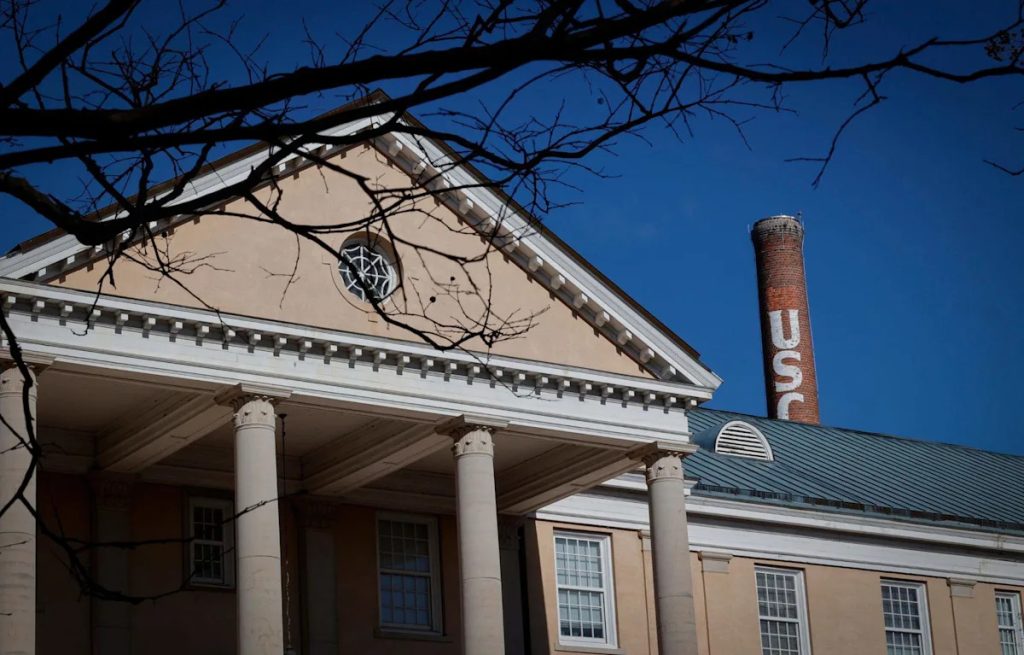Listen to the article
Conservatives Target University of South Carolina Over Diversity Content in Classrooms
Conservative politicians are mounting criticism against the University of South Carolina for teaching concepts related to diversity, equity, and inclusion (DEI), with some threatening to pull state funding despite no apparent violations of policy or law by the public flagship institution.
The controversy erupted after Libs of TikTok, a prominent conservative account on X (formerly Twitter), posted images allegedly showing DEI content in mandatory coursework. One photo depicted students in a required “University 101” course watching a short YouTube video titled “The Value of Diversity and Inclusion in the Workplace.” A second image reportedly from an “Understanding Disability” course showed a chart illustrating power dynamics across race, gender, religion, and disability status.
The social media posts accused USC of violating federal executive orders signed by President Donald Trump, with Libs of TikTok claiming “YOUR taxpayer dollars are being used to indoctrinate students with DEI propaganda.”
Several Republican politicians quickly amplified these claims. U.S. Rep. Ralph Norman, who is running for governor in 2026, stated on X: “You don’t have to be an accountant to find the abundance of wasteful spending in SC. Case in point, taxpayers are still funding DEI efforts.”
Members of the South Carolina House Freedom Caucus joined the criticism, with State Rep. Jordan Pace calling it “bigoted nonsense” and Rep. Jay Kilmartin labeling it “woke DEI crap.” Rep. Thomas Beach escalated the rhetoric with a direct threat: “Fix this if you value your state funding.”
U.S. Rep. Nancy Mace, another 2026 gubernatorial candidate, wrote: “This is absolutely UNACCEPTABLE, and we will be demanding answers. Public universities have no business forcing DEI propaganda on students.”
The University of South Carolina has declined to comment on the criticism.
The controversy comes amid a national debate over DEI initiatives in higher education. In January, President Trump signed two executive orders targeting diversity programs in government, banning policies and programs promoting diversity, equity, and inclusion, which he characterized as “discriminatory” and “radical.” However, these orders did not specifically address teaching materials or classroom content.
USC operates under policies that emphasize academic freedom. In 2023, the university’s board of trustees adopted the Chicago Principles, a widely recognized framework for freedom of inquiry and expression in higher education. According to university policy documents, “it is not the proper role of the University to attempt to shield individuals from ideas and opinions they find unwelcome, disagreeable, or even offensive.”
This latest incident reflects escalating tension over DEI in South Carolina’s higher education landscape. The backlash began in 2023 when the House Freedom Caucus investigated how much money the state’s public colleges and universities allocated to such programs.
While South Carolina has not yet passed legislation banning DEI initiatives, a bill did advance through the House in 2025. Despite the absence of state law prohibiting such programs, several institutions have preemptively altered their approach to diversity programming.
Both USC and Clemson University have renamed their offices of diversity, equity, and inclusion. Clemson took more dramatic steps in September, dissolving support groups created for Black students, LGBTQ+ individuals, and veterans. That same month, Clemson also removed DEI references from a chemical engineering class after Republicans raised concerns.
These developments in South Carolina mirror a broader national movement in conservative states to restrict or eliminate DEI programs in public institutions, reflecting deepening political polarization around issues of diversity and inclusion in American education.
Fact Checker
Verify the accuracy of this article using The Disinformation Commission analysis and real-time sources.




8 Comments
While the political accusations of ‘indoctrination’ seem hyperbolic, it’s understandable that some would be concerned about the content and framing of DEI initiatives. Universities should strive for objectivity and intellectual diversity in their curricula.
Curious to see how this controversy plays out. Universities have to balance academic freedom with responding to political pressures. It will be interesting to see if any policy changes or funding decisions result from this debate.
Absolutely, the tension between academic independence and political oversight is an ongoing challenge. Hopefully both sides can find a constructive way forward that respects diverse viewpoints.
This is a complex issue without easy answers. Promoting diversity, equity and inclusion are laudable goals, but the specific implementation and messaging can be divisive. Reasonable people can disagree on the appropriate role of DEI in higher ed.
Well said. These debates often generate more heat than light. Hopefully the university and policymakers can find a balanced approach that respects different perspectives.
Interesting to see the ongoing debate around DEI content in higher education. While some view it as important for fostering inclusive environments, others see it as ideological indoctrination. This issue certainly has people talking on both sides.
I agree, it’s a complex and polarizing topic. Reasonable people can disagree on the role and appropriate scope of DEI initiatives on university campuses.
The dispute over DEI content reflects deeper ideological tensions in society. While the political accusations may be overblown, universities should be mindful of maintaining academic freedom and intellectual diversity in their programming.